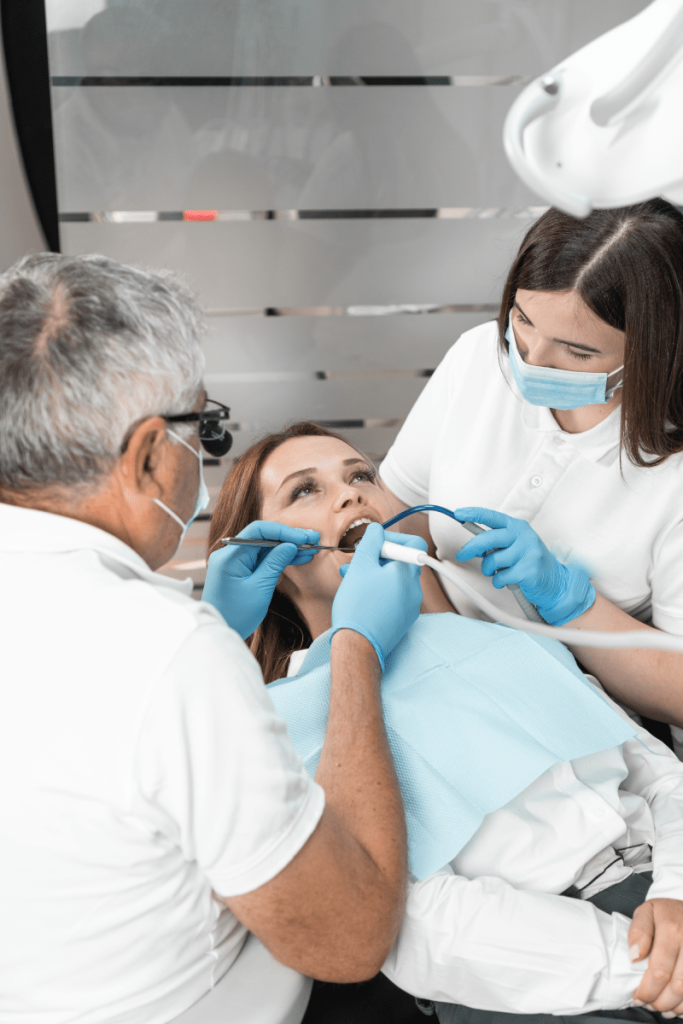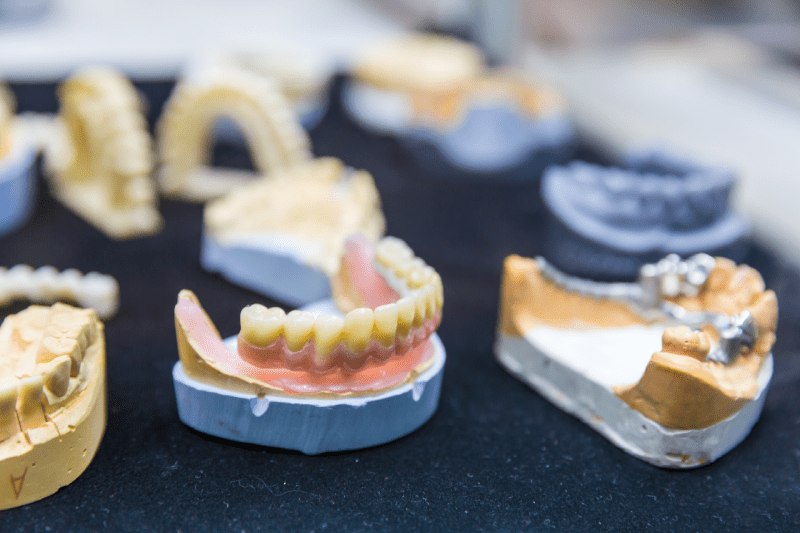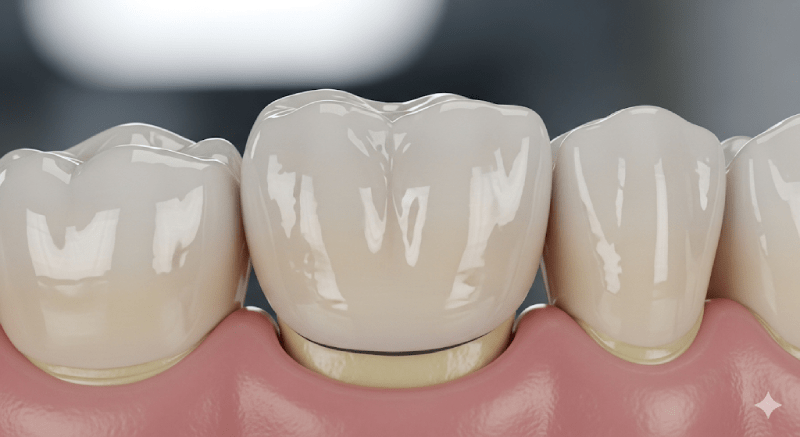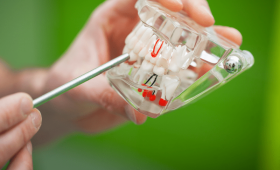What Is a Dental Crown and Why Is It Needed?
A dental crown is a custom-made cap used to cover a damaged or weakened tooth. It is typically made from materials such as porcelain, metal, or zirconia. It is used to restore the structure and function of decayed, broken, or cracked teeth, to improve their aesthetic appearance, or to be placed on a dental implant. This treatment restores the tooth’s original shape, size, and chewing function, offering a long-lasting solution.
Why Are Dental Crown Prices High in the Netherlands?
The main reasons for the high cost of dental crowns in the Netherlands include the high cost of living and business expenses. The salaries of highly qualified dentists, investments in modern technology and equipment, clinic rents, and taxes directly affect these costs. Additionally, the high health and safety standards in the country are reflected in the costs. The combination of these factors makes the prices of dental services in the Netherlands higher compared to other countries.
What Is the Average Cost of a Single Dental Crown in the Netherlands?
The average cost of a single dental crown in the Netherlands can vary greatly depending on the material used, the clinic’s location, and the dentist’s experience. For example, porcelain or zirconia crowns are more expensive than metal crowns. Prices can also be higher in city centers or luxury clinics. Furthermore, the total cost may increase if additional procedures like root canal treatment or fillings are needed. On average, the price of a crown can range from hundreds to thousands of Euros.
Why Are Zirconia Crowns More Expensive in the Netherlands?
Zirconia crowns are more expensive than other types of crowns in the Netherlands. This is due to the high aesthetic value and durability of zirconia. As a metal-free, biocompatible material, zirconia offers a very natural-looking appearance similar to a real tooth and reflects light in a similar way. The manufacturing process is more complex and technologically advanced. These aesthetic and functional superiorities lead to a higher price for zirconia crowns.
Is the Dental Crown Price Covered by Insurance?
In the Netherlands, dental crown treatment may be partially or not covered at all by health insurance. Basic health insurance usually does not cover dental services except in emergencies. However, individuals with a comprehensive additional dental insurance package may have a portion of their dental crown treatment costs covered by insurance. It is important for patients to contact their insurance companies to learn about their policy coverage in detail before starting the treatment.
What Is the Cost of Metal-Fused Porcelain Crowns?
Metal-fused porcelain crowns are a more affordable option than zirconia crowns in the Netherlands. These crowns are made by coating a metal substructure with porcelain. They combine the durability of metal with the aesthetic appearance of porcelain. They can be preferred when aesthetic appearance is not a priority or for back teeth. However, they may have aesthetic disadvantages, such as the metal substructure forming a dark line at the gum line over time.
How Long Does Dental Crown Treatment Take in the Netherlands?
Dental crown treatment in the Netherlands usually requires two to three appointments. In the first appointment, the tooth is prepared, impressions are taken, and a temporary crown is placed. The impressions are sent to a lab, and the permanent crown is prepared within a few days. In the second appointment, the temporary crown is removed and the permanent crown is cemented onto the tooth. The total duration can vary between one and two weeks, depending on the clinic’s workload and the lab’s turnaround time.
Is Pain Felt During Dental Crown Treatment?
Since dental crown treatment is generally performed under local anesthesia, the patient does not feel any pain or discomfort during the procedure. There may be a slight sensitivity or pain when the effect of the anesthesia wears off, but this can usually be easily controlled with painkillers. The dentist takes all necessary precautions for the patient’s comfort. The procedure is extremely comfortable, and most patients report a more pleasant experience than they expected.
Is a Visa Required for Dental Crown Treatment in the Netherlands?
Whether a visa is needed for individuals traveling to the Netherlands for dental crown treatment depends on their country of citizenship. Citizens of European Union countries can generally travel to the Netherlands visa-free. However, a Schengen visa may be required for those coming from other countries. It is important for patients to check their own country’s visa requirements before making travel plans.
What Materials Are Used for Dental Crown Treatment?
Different materials are used for dental crowns. The most common ones are porcelain, metal-fused porcelain, all-ceramic, and zirconia crowns. Porcelain and zirconia offer the best aesthetic results, while metal-fused porcelain provides a balance of durability and cost. All-ceramic crowns are ideal for achieving a natural look on front teeth. The choice of material is made based on the tooth’s location, aesthetic expectations, and the patient’s budget.
In Which Clinic Is the Best Dental Crown Done in the Netherlands?
The best dental crown in the Netherlands is not tied to a single clinic. The best treatment is one that is done by an experienced dentist, with modern equipment, and high-quality materials. It is important to check the clinic’s website, read previous patient reviews, and ask about the dentist’s experience and success rate. This way, you can find the most suitable clinic for you. Price is not the only criterion for quality.

What Is the Recovery Process Like After Dental Crown Treatment?
The recovery process after dental crown treatment is generally quick. There may be a slight sensitivity or pain for the first few days, but this can usually be controlled with medication. Patients are advised to avoid hard foods to prevent the temporary crown from breaking before the permanent one is placed. Normally, normal eating habits can be resumed within a few days. The dentist stays in contact with patients throughout the recovery process to offer support.
Why Do Dental Crown Prices Vary Between Cities?
Dental crown prices in the Netherlands can show significant differences from city to city. For example, prices at clinics in major cities like Amsterdam or Rotterdam are generally higher than those in smaller cities. This difference is due to factors such as higher operating costs in major cities, increased competition, and clinics investing in more modern equipment. However, the likelihood of finding more options and experienced dentists is also higher in larger cities.
When Does Dental Crown Treatment Fail?
While the failure of dental crown treatment is rare, it can happen in some cases. The main reasons for failure include the crown not fitting properly, a new cavity forming under the crown, or the crown cracking or breaking. Additionally, poor oral hygiene or habits like teeth grinding can shorten the crown’s lifespan. In case of failure, the dentist can remove the crown and place a new one. This situation is generally evaluated under the clinic’s warranty.
How Long Do Dental Crowns Last?
Dental crowns can last for many years with proper care and regular check-ups. The lifespan of a dental crown typically ranges from 10 to 15 years, but this period can be extended depending on the patient’s oral hygiene, eating habits, and regular dental visits. Avoiding biting on hard foods and using a nightguard for habits like teeth grinding helps to extend the life of the crown.
How Long Do You Need to Stay for Dental Crown Treatment in the Netherlands?
The duration of stay for dental crown treatment in the Netherlands can take a few days, as it usually requires two to three appointments. In the first appointment, the tooth is prepared and impressions are taken, while the lab process for the permanent crown is awaited. This process can typically take about a week. Therefore, patients need to visit the clinic again a few days later for the second appointment. This period allows patients to both get treatment and explore the city.
What Should Be Done Before Dental Crown Treatment?
The preparation for dental crown treatment begins with a detailed evaluation of the patient’s oral and dental health by a dentist. This examination may include X-rays and other imaging methods. Existing cavities, gum diseases, or other problems are treated. This preparation process is fundamental for the successful placement of the crown and minimizes all risks. A healthy foundation guarantees the longevity of the crown.
What Other Factors Affect the Dental Crown Price?
Other factors affecting the dental crown price include the technology offered by the clinic, the dentist’s experience, and the quality of the lab used. Modern equipment like digital scanners and CAD/CAM (computer-aided design/computer-aided manufacturing) systems can speed up the treatment process and increase accuracy, but also increase the cost. Working with an experienced dentist and a reliable lab directly affects the success of the treatment and the quality of the crown.
Why Are Porcelain Crowns More Affordable?
All-porcelain crowns are generally more affordable than metal-fused porcelain or zirconia crowns. As they do not contain metal, these crowns transmit light better and offer a natural aesthetic, but their durability is not as high as zirconia. They can be used for aesthetic purposes on front teeth but may not be suitable for back teeth that are exposed to more chewing force. Their prices result from simpler manufacturing processes.
What Is the Most Suitable Age for Dental Crown Treatment?
There is no specific upper age limit for dental crown treatment, but tooth development must be complete. Therefore, it is generally applied to individuals aged 18 and over. Elderly patients with damaged or decayed teeth can also be candidates for crowns as long as their general health status is good. The dentist evaluates each patient’s individual condition and determines their suitability. Age alone is not an obstacle to treatment.
What Documents Are Required for a Dental Crown in the Netherlands?
For dental crown treatment in the Netherlands, identity documents such as a passport or ID card and, in some cases, medical reports showing a health history are generally requested. It is important to contact your clinic before starting the treatment to find out which documents are necessary. If you will be using insurance, an insurance card or policy information may also be required.
What Should Be Considered After Dental Crown Treatment?
After dental crown treatment, hard and sticky foods should be avoided for the first few days. The painkillers recommended by the dentist should be used regularly, and oral hygiene should be taken care of. Regular brushing around the crown and using dental floss are vital to maintaining the health of the crown and gums. Following these recommendations extends the life of the crown and reduces the risk of complications.
What Is the Difference Between Dental Crowns and Veneers?
Dental crowns restore a tooth by covering it completely, while veneers (porcelain laminates) are only used to cover the front surface of the tooth. Crowns are a solution for severely damaged or decayed teeth, while veneers are generally preferred to correct aesthetic problems such as discoloration, shape irregularities, or small fractures. Less tooth structure is removed for a veneer.
How to Clean and Maintain Dental Crowns?
Dental crowns should be cleaned meticulously and regularly, just like natural teeth. Brushing at least twice a day, using dental floss, and mouthwash are necessary. Special attention should be paid to the area where the crown meets the gum. You can use toothbrushes or interdental brushes recommended by your dentist to clean around the crown. Proper care extends the life of the crown and protects oral health.
How to Book an Appointment for Dental Crown Treatment in the Netherlands?
Booking an appointment for dental crown treatment in the Netherlands is quite easy. Many clinics accept appointments via their websites or over the phone. Some clinics offer the possibility of communication via online forms or email for the initial consultation. International patients can make communication easier by choosing clinics that offer services in English or other languages.
What Is the Difference Between a Dental Crown and a Dental Filling?
A dental filling is used to repair small to medium-sized cavities in a tooth, while a dental crown is a cap designed to protect the structure of a severely damaged or cracked tooth. A filling only fills the damaged part of the tooth, while a crown surrounds the entire tooth. Crowns are used to preserve the tooth’s integrity and strength in situations where fillings are insufficient.
What Is the Importance of a Temporary Dental Crown?
A temporary dental crown is used to protect the tooth, prevent sensitivity, and maintain its aesthetic appearance until the permanent crown is ready. It also helps to preserve the tooth’s shape, preventing surrounding teeth from shifting and supporting the gums’ healing process. It is usually made of acrylic or a similar material and is temporarily cemented to the tooth. It helps the tooth to function until the permanent crown is placed.

What Are the Latest Technologies Used in Dental Crown Treatment?
The latest technologies used in dental crown treatment include digital scanners, CAD/CAM (computer-aided design/computer-aided manufacturing) systems, and 3D printers. Digital scanners make taking impressions more comfortable and accurate, while CAD/CAM systems speed up the design and manufacturing process of the crown, even allowing for same-day crown creation. These technologies make the treatment process more efficient and patient-friendly.
What Are the Alternatives to Getting a Dental Crown in the Netherlands?
The alternatives for those who want to get a dental crown in the Netherlands depend on the treatment recommended by the dentist. For less damaged teeth, solutions like fillings or porcelain onlays or inlays can be preferred. If the tooth is too damaged to be saved, tooth extraction followed by implant treatment or a bridge application can be an alternative. The dentist determines the most suitable option for the patient’s condition.
What Are the Additional Costs That Affect the Dental Crown Price?
Additional costs that may arise on top of the dental crown price depend on the patient’s oral health condition. If a root canal treatment is needed for the tooth where the crown will be placed, this creates an additional cost. Also, fillings or other gum treatments can increase the total cost. Therefore, it is important to discuss all potential costs with the dentist before starting the treatment.
What Is the Difference Between Dental Crowns and Natural Teeth?
Dental crowns have almost the same appearance and function as natural teeth, but there may be microscopic differences. A well-made crown, when colored and shaped correctly, is indistinguishable from natural teeth. However, the surface of crowns does not stain or whiten like natural teeth, so if teeth whitening is to be done, the crown may also need to be replaced.
What Payment Methods Are Accepted for Dental Crown Treatment?
Dental clinics in the Netherlands accept various payment methods for the convenience of patients. These include cash payment, debit cards (Maestro, V Pay), credit cards (Visa, Mastercard), and bank transfers. Some clinics may also offer payment installments depending on the treatment plan and cost. It is important to clarify the payment options before starting the treatment.
In What Cases Might Surgery Be Needed in Dental Crown Application?
Dental crown application generally does not require a surgical procedure, but in some special cases, surgical intervention may be necessary. If the decayed or damaged part of the tooth extends below the gum line, the dentist may perform a minor gum surgery to create enough space for the crown. Additionally, for teeth that have undergone root canal treatment, an additional post or filling may be needed for the crown to be securely placed.
What Factors Are Important in Choosing a Dental Crown?
The most important factors in choosing a dental crown are the tooth’s location, aesthetic expectations, and budget. While durability is a priority for back teeth, aesthetic appearance is more important for front teeth. Zirconia and all-porcelain crowns are the best aesthetic options, while metal-fused porcelains offer a balance of durability and price. The dentist considers the patient’s needs and expectations to choose the most suitable crown.
Is It Logical to Go Abroad Instead of Getting a Dental Crown in the Netherlands?
Going abroad instead of getting a dental crown in the Netherlands can be a logical option, especially for those who want to reduce costs. Countries like Turkey or Poland offer much more affordable prices than the Netherlands. However, patients must consider travel expenses, duration of stay, potential additional appointments, and communication. To guarantee quality, they should thoroughly research the clinic and dentist they will visit and check their references.



